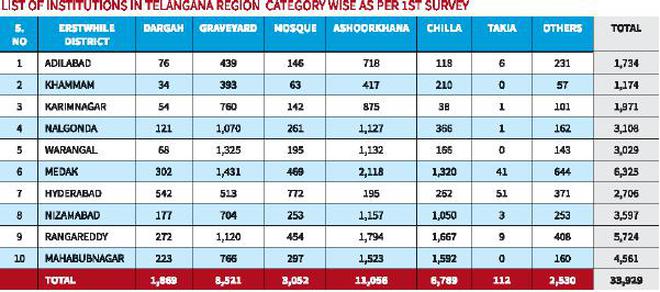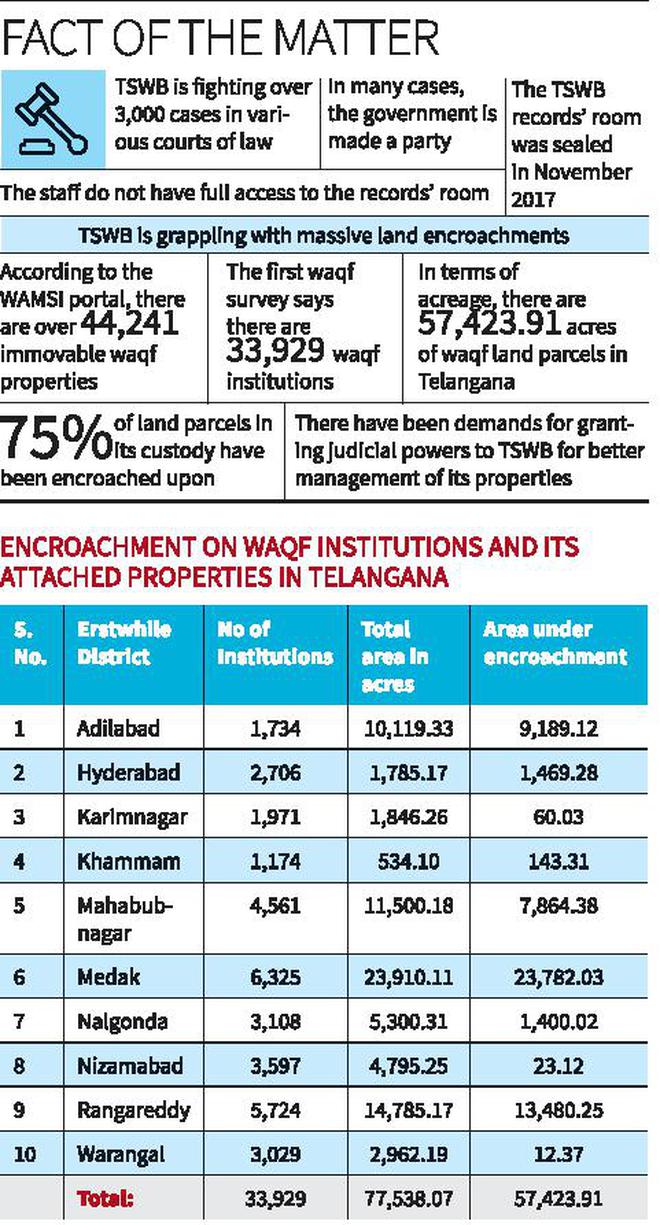Come November, it will be five years since the State government sealed the records’ room of the Telangana State Waqf Board (TSWB), a panel that deals with the administration of Muslim endowments.
The Waqf Board also looks into issues concerning the protection of waqf properties, including by means of litigation.
It, therefore, comes as a surprise that despite nearly five years, the TSWB, which is an autonomous body, has not succeeded in getting its own records’ room, a place where crucial unsealed records are stored. The board is yet to take its full possession from the Revenue department which, reportedly acting on the instructions of Chief Minister K. Chandrasekhar Rao, had sealed it in the presence of police.

The issue of partial accessibility resurfaced only recently after TSWB member, elected under the mutawali (manager of waqf institutions) category, Abul Fatah Syed Bandagi Badesha Quadri, shared with the media a letter that he wrote to the government.
In the letter, he requested the CM to take steps to unseal the records’ room. He claimed that the board and its officers not having immediate access to relevant records is a cause of concern, and has been posing problems, especially when documents regarding properties in litigation are required.
While on the one hand, a section of TSWB staff maintains that permission is required from the Revenue department, and the Tahsildar, in particular, to access these records, on the other hand, they said that this new process is not much of a hassle. But, the questions that arise out of Mr. Quadri’s representation appear valid: For how long will the records’ room remain sealed? And what measures has the board taken to reverse the situation?

“We are facing a lot of problems. The board, its members and officers, should have direct access to waqf records,” Mr. Quadri told The Hindu. “Broadly speaking, the Waqf Board is fighting cases against encroachers of small land parcels. In few other cases that are connected to larger land, it is fighting or has fought cases against the government and its agencies.”
Mr. Quadri’s take on the issue underscores the large number of cases that TSWB is fighting in various courts of law.
A senior staff member said, “There are nearly 3,000 cases that the board is fighting in different courts, and over 1,200 cases are being heard or are pending at the Telangana State Wakf Tribunal. Another 1,500 cases are with the High Court. This is a very large number.”
In March this year, TSWB CEO Shahnawaz Qasim articulated the problem in a different fashion. He apprised the Registrar (Judicial) of the Telangana High Court about the difficulty that the board has been facing in connection with filing counters in time at the Waqf Tribunal.
Online system mooted
Suggesting that an online case monitoring system, much like the one at the High Court, be put in place at the Waqf Tribunal, Mr. Qasim stated that hundreds of cases are pending here.
Pointing out the inconvenience that the board’s staff has been facing in connection with filing counters, he wrote, “In the Telangana State Wakf Tribunal also, TSWB has more than 1,200 cases, for which the Standing Counsels of the board, liaison assistants and other staff have to visit the tribunal every day to know the case status, particularly for filing counters, and written statements in time.”
A staff member said that a recent review meeting showed that the suggestion of an online case management system has not been put in place at the Wakf Tribunal. Shedding more light on the board taking on the government, a senior TSWB official, requesting anonymity, said that the Revenue department in general, and the District Collector in particular, invariably become parties in several cases on account of disparities in records that describe the nature of land parcels. In fact, this is a major bone of contention between the TSWB and the government.
“While the waqf records show a property to be theirs, revenue records show something else like ‘government land’. And when there is a dispute, the matter eventually goes to the tribunal or another court, where collectors are made a party. The exact number of such cases is not available, but there are many of them. That being said, we stick to our waqf records,” he said.
In an attempt to ameliorate the situation, and avoid possible clashes over registration of waqf land to other parties, the senior officer said that data on waqf land parcels as per waqf records have been shared with RDOs, Collectors and Revenue officials.
“In 2020, we gave them a DVD containing information on gazette notifications of waqf properties in the State. This way, when lands or properties come up for registration, Revenue officials can check the gazettes and connected records and take suitable measures,” he said. “But despite this, a reconciliation of waqf and revenue records is required.”
Requests to the government are made time and again to update the nature of land as ‘waqf’ in the Dharani portal as and when required. An overwhelming majority of the aforementioned counters pertain to encroachments and disputes connected to waqf land parcels.
According to the first waqf survey, Telangana had 33,929 waqf institutions with land parcels of 77,538 acres, out of which the extent of encroachment is 57,423.91 acres. This means, as much as 75% of waqf land have been encroached.
Uphill task
Alternatively, the Centre’s Waqf Assets Management System of India (WAMSI) suggests that there are as many as 44,241 immovable waqf properties in Telangana. Board officials said that the second waqf survey, the data of which was submitted to the board in 2017, threw up a larger number of institutions – around 46,000 – and larger acreage. However, with the board short-staffed, lacking a cadre strength, and in the absence of judicial powers, clearing encroachments appears an uphill task.
“Protection activists demand that the government grant judicial powers to TSWB, which will help it get rid of encroachments faster. In 2014 and 2017, the CM also spoke in its favour, but unfortunately, the state of affairs remains the same. Every district is huge and waqf inspectors are few,” said waqf protection activist and Congress leader Osman al Hajiri.







